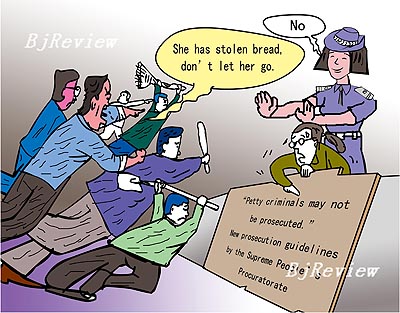
People convicted of petty crimes may be let off with just a slap on the wrist after an amendment to prosecution guidelines was recently released by the Supreme People's Procuratorate, China's highest judicial organ. Those exempted from prosecution will be assessed on a case-by-case basis, but leniency could be given to minors, the elderly and people who have slightly breached the law because of poverty.
According to the new guidelines, procuratorial departments will not necessarily pursue serious charges against petty criminals who target neighbors, relatives or friends if they plead guilty, apologize and voluntarily offer compensation. Other suspects to be exempt include those without "vicious" motives, as well as people who are minor accessories in criminal cases.
China's Criminal Procedure Law gives powers to local procuratorial departments to prosecute based on community expectations, the severity of the crime and local economic conditions.
The guidelines manage a combination of punishing the guilty as well as protecting citizens' lawful rights, as they prescribe different treatment for small and serious crimes, minors and adult suspects and accessories to crime.
Those who support the new guidelines believe that drawing lines between different circumstances can better protect human rights. The non-prosecution of the poor is a humane practice and the more compassionate approach toward petty criminals will help them put their lives back in order and better serve their families.
The opponents to these new guidelines, however, believe that while practicing leniency toward the poor, the Supreme People's Procuratorate is adding to the stress of ordinary citizens, as they may become innocent victims of crimes. Moreover, there is a fear that if petty crimes are not discovered or punished in a timely way, more serious consequences will follow. Many people suggest that if mercy is to be given to the poor, it would be far better for it to be in the form of an effective social security system, rather than to exempt the disadvantaged from prosecution.
Poverty is not an excuse for crime
Zhu Xinmei (Jiangnan City Daily): To ensure a basic standard of living for the poor, including beggars and vagrants, the government should take responsibility to develop a good social security system. But now, it seems, this problem is to be solved by allowing the poor to steal others' property. The Supreme People's Procuratorate's new guidelines are hard to understand because it is asking some citizens to pay for the living of the poor.
More importantly, this regulation is violating the principle that "everyone is equal before the law" and the legal principle that citizens' property is inviolable. One of the most important aspects of a civilized society is to protect citizens' property from violation. Crimes, serious or petty, should be punished by law. If not, it destroys social values.
Guo Songmin (www.xinhuanet.com): The new prosecution guidelines of the Supreme People's Procuratorate is well-intended and conforms to the tradition of the combination of severity and leniency in China's judicial system.
In today's Chinese society, people's moral level is not high enough to understand the essence of non-prosecution. When they get to know that there will be no prosecution against them, criminals who have committed a small crime may feel thankful for the judicial system, but it's quite doubtful whether they will stop committing crime.
For someone who is living a poor life, the cost of crime is low. He or she does not have much to lose. Punishment exists to make crime more costly to criminals, so they won't do it again. Lack of prosecution will only encourage more crimes.
Li Long (Guangzhou Daily): Of course criminal laws should conform to the principle of combining severity and leniency, but if the laws are too tolerant and loose, its deterring effect will be greatly damaged. According to the new guidelines of the Supreme People's Procuratorate, those who committed petty crimes because of poverty can be excluded from prosecution. This seems to be encouraging theft and robbery.
How do we judge if these people are forced to commit crimes because of poverty? Are vagrants seen as a poor group? So can they steal as they please? It's ridiculous. I do believe that most people commit theft because of poverty. Then, according to the new guidelines, most thieves can escape punishment. This is unfair to other thieves. Poverty cannot be used as the excuse for committing crimes.
Maybe non-prosecution for small crimes can save a lot of judicial resources, but this is not the proper way to save resources. Although, apart from lesser penalties, there are other ways to help first offenders or those who commit petty crimes to renounce their bad ways, the problem is there is still no complete education system to help and rehabilitate them.
Compassion more effective than punishment
Zhang Tianwei (Beijing Youth Daily): According to the new guidelines issued by the Supreme People's Procuratorate, leniency will only be given
| 